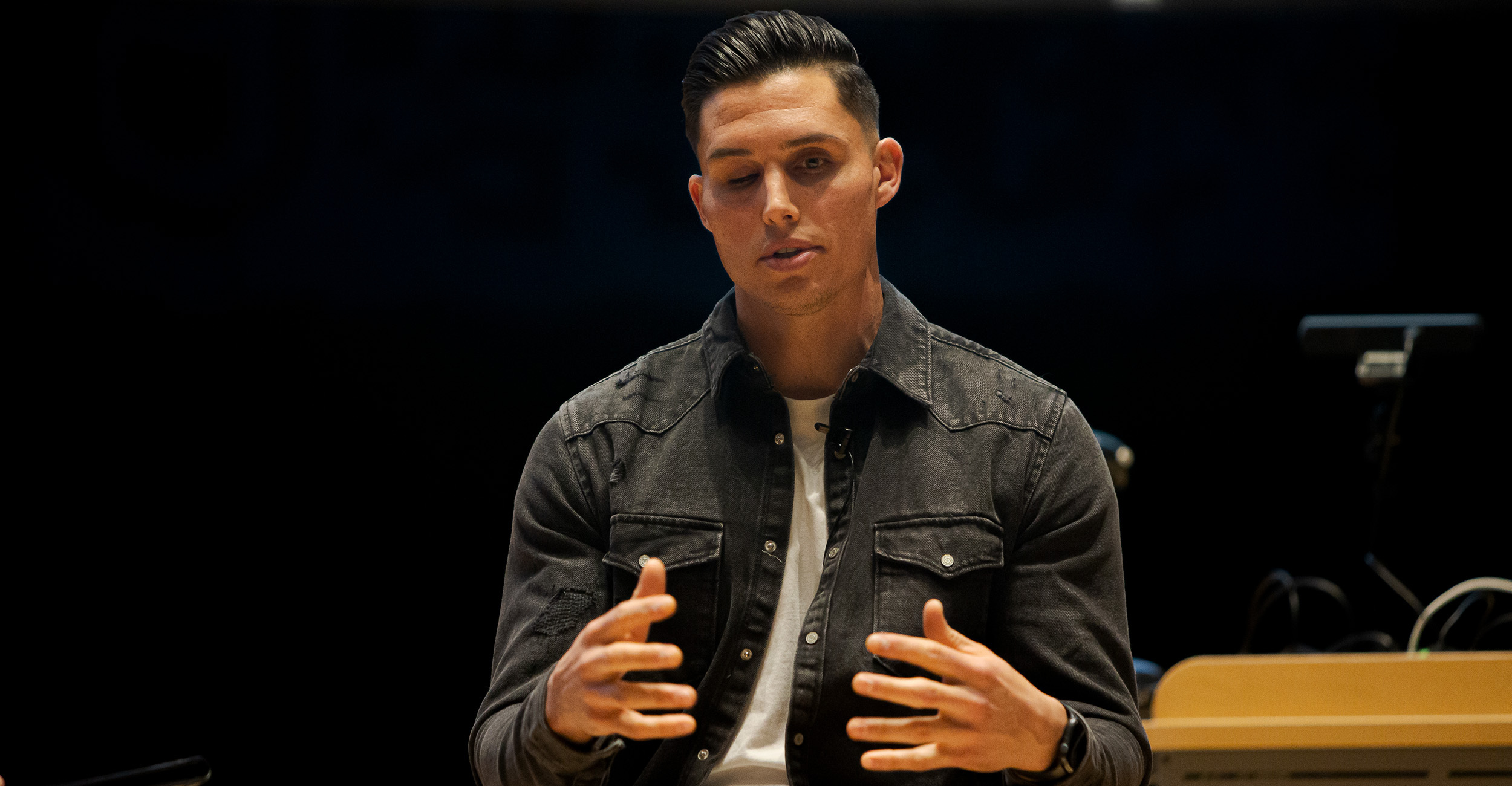For most of his life, Drew Robinson was taught to rely on his physical strength, leaving his mental strength to wither.
But, after the lowest moment in his life, it was his mental strength that saved him.
On Nov. 1, the Oklahoma State University Department of Wellness welcomed Robinson, a 30-year-old former professional baseball player, to the stage of the Student Union Theater to talk about his experience surviving a suicide attempt and the importance of discussing mental health.
On a surface level, everything about Robinson’s life looked perfect. In 2020, he was finally pursuing his lifelong dream of playing Major League baseball, plus he had a supportive fiance, a loving family and a promising career.
Below the surface, though, Robinson was battling with depression, self doubt and the darkest thoughts he had ever encountered. On April 16, 2020, Robinson attempted to take his life.
A gunshot to his right temple took the sight in his right eye, but otherwise left him unharmed.
Against all odds, he not only survived but emerged with a new sense of purpose and gratitude for life. Robinson wanted to share his experience with others to encourage those struggling with mental health to ask for help.
“I believe I was meant to experience everything the way I did,” Robinson said. “Surviving for 20 hours leading up to the 911 call doesn’t add up scientifically or anatomically, but it does spiritually. I’m here to help others. I’m here to tell anyone that no matter what internal battle is happening within you, you are strong enough mentally and physically to overcome it, learn from it and eventually give thanks to what has happened to you.”
There is a lot of stigma surrounding the concept of mental health. Before his suicide attempt, Robinson spent much of his time and energy projecting a confident, put-together version of himself. The people closest to him would never have guessed what he was truly going through, and how could they?
Robinson now wants to use his story to spread the message that it is OK to not be OK.
“Unfortunately, what happened in 2020 was a culmination of a lot of ingrained thought patterns and unaddressed issues that I was holding on to,” Robinson said. “Throughout childhood, I developed a habit of comparing myself and not feeling like I was good enough, which followed me into my adulthood.”
Mental health is discussed more now than it has ever been before, but there is still a lot of progress that needs to be made in fighting the stigma surrounding it.
“Especially nowadays with things like social media and the pandemic and other things going on in the world, life in general is a lot harder for young people,” said Wylie Dyer, a senior majoring in management and marketing at OSU. “It’s important to remember when you’re comparing yourself to other people on social media, you’re only comparing yourself to a snapshot of their life. You never know what someone is truly going through.”
On the outside, Robinson had everything he had ever wanted in life. He was searching for help but never asked for it because he believed he shouldn’t need it. Now, Robinson realizes that taking steps to improve well-being should be recognized as a sign of courage, not as a sign of weakness.
“As an athlete, all I was taught in life was the physical side of strength,” Robinson said. “Now I’m learning that there are a lot of different forms of strength. Being able to admit that you don’t have it all figured out sometimes, being able to address something that’s holding you back and being comfortable enough to be your most authentic self takes a lot of strength.”
More importantly, strength is being able to reach out to others when help is needed. The misconception that mental health is something to be faced alone can lead to dangerous thought patterns and isolation. Robinson’s battle with mental health is not over, but with the help of his support system he is more equipped to face internal struggles.
“At the Department of Wellness we are consistently trying to make sure that everyone’s aware of the resources we have available and that we are here to serve them whenever it’s needed,” said Dr. Kari Pratt, assistant director of health education. “Students are here to get a degree and plan for their future. When you’re not mentally healthy, you’re not a successful human being or a successful student, so you really have to focus on that mind-body connection.”
Two and a half years ago, Robinson made a choice to live. Since that day, he has repeatedly chosen not only to live, but to live fully and with a purpose.
“I like to say that I’m a 27-year veteran of a pessimistic world and a three-year rookie of gratitude and optimism,” Robinson said. “It’s so important to take mental health seriously. It might not seem like a big deal at the time but at some point it could become a life-or-death situation and I don’t want anyone else to experience the things I’ve experienced for myself.”

Original source can be found here
 Alerts Sign-up
Alerts Sign-up